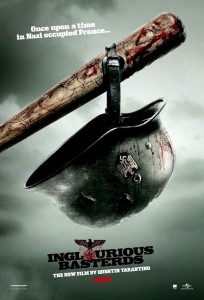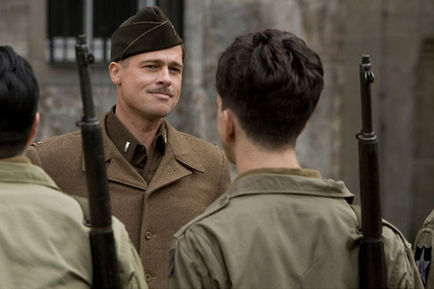
“Oh my god, is Q.T. really going to do that?!” should be your reaction the first time watching this. In his own unique way of beserk cinematic splendor, Quentin Tarantino never ceases to surprise. Tarantino has countless cinematic influences and when he visually quotes from other movies yet he often makes it just plain damn better than the movies he is quoting from. In this film he is quoting Josef von Sternberg, Sergio Leone and Brian DePalma though you would have to be a movie nerd to know that. Anyone with an appetite for dazzling movie love can be enthralled by Tarantino’s gamesmanship without knowing his original sources of inspiration. Inglorious Basterds borrows a title as well from a cult 1978 Italian flick, but the story is all Tarantino’s own. It should be a classic among anyone who likes to see artistic and cultural rules be broken.
This World War II flick – and it’s a flick because it is certainly not history – can be categorized as an angry revenge fantasy. It’s a boyhood fantasy of good American G.I.s kicking Nazi ass, and humiliating them in the process. Brad Pitt as Lt. Aldo Raine, leader of the Basterds, orders his outfit to scalp the Nazis at their death with no mercy. Proof in an early scene, a Nazi is spared his life but has to endure a permanent reminder of his Mein Fuhrer origins by way of nasty incision.
The other crew Basterds are played by the likes of Til Schweiger, Omar Doom, B.J. Novak, Gedeon Burkhard and Eli Roth as “The Bear Jew,” who earns his title by viciously clubbing Nazis to death with a baseball bat. If you are not familiar with these actors’ names you will sure be familiar with at least their faces after the curtain closes. Now if you know anything about World War II history than you know, of course, there was no such renegade outfit as the Basterds. But Tarantino does resurrect other real figures such as Winston Churchill (Rod Taylor), Joseph Goebbels (Sylvester Groth) and Hitler (Martin Wuttke) and cunningly spins them off in his own creatively licensed directions.
Tarantino can be too much of a storytelling oddball in the way he uses revolving chapter breaks, flipping between three separate languages in a single scene, and at times leaving the Basterds off-screen for a thirty-minute period. You might feel you miss the Basterds when they’re off. Yet all of Tarantino’s characters are so vividly imagined that it is all too easy to swept away by other great players in this tale. An over-plump Mike Myers memorably hams it up as General Ed Fenech, the stunning Melanie Laurent as an escaped German named Shosanna now hides out as a French proprietor of a movie palace, the enigmatic Diane Kruger as German actress Bridget von Hammersmark turned double agent, the gentlemanly and multi-lingual Michael Fassbender as freedom fighter and film historian Lieutenant Archie Hicox, the seething but charming Daniel Bruhl as Nazi sniper Fredrick Zoller whom has a passion for the cinema. Bruhl, in particular, is likely to go down as the most underrated actor in this impeccable ensemble.
One actor that will be infinitely remembered is Cannes Film Festival Best Actor winner Christoph Waltz as Nazi Colonel Hans Landa. Austrian actor has dozens of French film credits, but rarely has had an American film credit (he was briefly seen in “Goldeneye”). Waltz gives an astounding sinister performance as a “Jew hunter,” and he is likely to go down as one of Tarantino’s greatest villains. Col. Landa lives not by the Nazi code, but by his own code – he’s tickled by his own precise instincts.
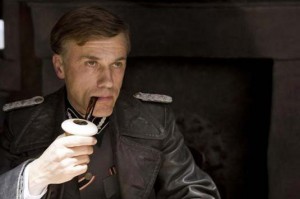 The masterful opening sequence of the film features Col. Landa inspecting a French farmer’s home, chats with the farmer over a glass of milk, laughs and guffaws through the conversation before he makes a great, terrible implication that he knew more than he let on before entering. The scene is, I repeat, masterful in every way that a scene can possibly be masterful in terms of drama, suspense, cinematography, acting, and manipulation of language and dialect.
The masterful opening sequence of the film features Col. Landa inspecting a French farmer’s home, chats with the farmer over a glass of milk, laughs and guffaws through the conversation before he makes a great, terrible implication that he knew more than he let on before entering. The scene is, I repeat, masterful in every way that a scene can possibly be masterful in terms of drama, suspense, cinematography, acting, and manipulation of language and dialect.
Nothing is more rib-tickling at the movies this year than watching Waltz outwit and verbally out-scoff his adversaries, always coming in under the radar with his cordial gentlemanly demeanor. But Tarantino is a directing virtuoso for a very good reason, most pointedly in the way he uses a close-up on an actor frozen in fear, or when essential, trembling in fear. When Col. Landa and refugee Shosanna are face-to-face at a brunch, the tension-filled power between the two of them is at high pulp.
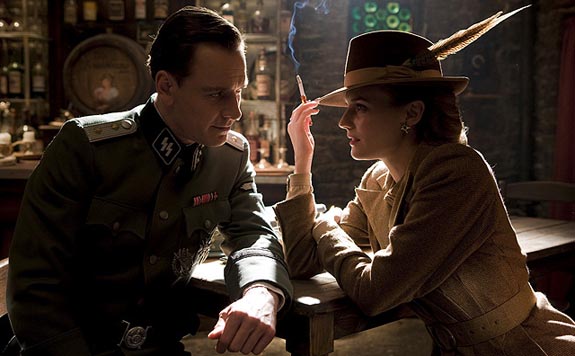 Speaking of Tarantino’s liberties with fiction, the auteur always delivers hunky and chewy dialogue. Tarantino has always been more than just a dazzling wordsmith. He uses long, blustery dialogue to prolong the suspense to the extent of agony (the underground pub scene might actually go on a tad too long). “Inglorious Basterds,” like Tarantino’s other pics, are acts of gamesmanship because as a viewer you’re sitting back having no idea how long he is going to boil a scene until he lets it fully erupt. Patience is rewarded in Tarantino-land.
Speaking of Tarantino’s liberties with fiction, the auteur always delivers hunky and chewy dialogue. Tarantino has always been more than just a dazzling wordsmith. He uses long, blustery dialogue to prolong the suspense to the extent of agony (the underground pub scene might actually go on a tad too long). “Inglorious Basterds,” like Tarantino’s other pics, are acts of gamesmanship because as a viewer you’re sitting back having no idea how long he is going to boil a scene until he lets it fully erupt. Patience is rewarded in Tarantino-land.
If you can withstand the (pleasurable) agony of suspense then it must be said that his over-the-top climax, taking place at Shosanna’s movie palace where the Nazi propaganda film “Nation’s Pride” is being shown with Zoller as the centerpiece actor, is deliriously and violently extravagant in a way that reminded me of DePalma’s ending in “Scarface,” preceded by Pitt and company’s mangling of the Italian word Bongiorno that is right out of the Marx Brothers.
We have had plenty of share of WWII movies that have done history right, and too many in recent times like “Defiance” and “Valkyrie” that pretend that they are foremost history lesson articles but serve up superficial action to “entertain” us – as a result boring us with their inauthenticity. “Inglorious Basterds” has no pretensions, only intentions in thrilling us and joshing us (before this we only thought WWII movies could go about it in one way). Tarantino is a premiere artist in crazy subversive fun and if he wants to lace a scene with David Bowie rock music, then let it be damned, let him lace a scene with David Bowie rock music.
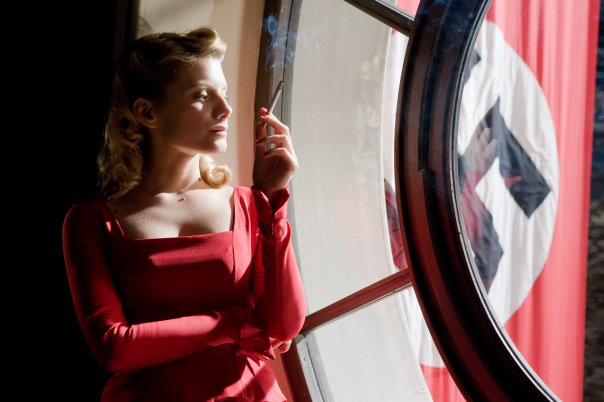
153 Minutes. Rated R.
WORLD WAR II / THINKING MAN’S ACTION MOVIE / MASTERPIECE VIEWING FOR ANYTIME
Film Cousins: “Inglorious Bastards” (1978, Italy); “Scarface” (1983); “Pulp Fiction” (1994); “Kill Bill Vol. 1” (2003).
